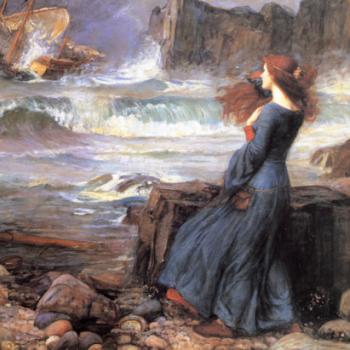Ebenezer Scrooge has refused to make merry on Christmas and so Christmas jests with him. Sinners are always serious when they should be merry, and trivial when they should be serious. Christmas Past reminded Scrooge of chances missed and Christmas Present will teach him of opportunities about to be squandered.
The Ghost of Christmas Present is really the Ghost of Christmas Soon to Be. One cannot actually live in the present . . . one can seize the “day” (to come) but is always losing now. If one tries to attend to “now,” then one is not living in it, but missing it for thinking about it. The person who tries to live in the present in this since is usually living in the “just past.” He is worshipping an image of the beauty that just was . . . while always missing the experience that is.
The Ghost of Christmas Present lives as Christian spirits must in an anticipated future. The shadow of what will be contain those things that are fixed by Divine Will and those events that can change with freewill. The sentient beings of the cosmos are allowed to dance with creation, but the possibilities are not endless, they are constrained by the past and are being shaped by now. Anticipation, the Christian virtue of hope, allows us to see the present just before it comes and so enjoy it as it arrives. We see tomorrow in our evening prayers and so are ready for most of it when it comes. For the rest, we trust to God.
Scrooge does not anticipate or hope instead he tries to control the future by his money. The immediate future, however, denies his power. Men will be merry with or without him. Scrooge deprives Scrooge and though he can hurt Bob Cratchitt and other men, he cannot make them unhappy if they will not allow him to do so.
Like Mark Tapley in Martin Chuzzlewit, Bob Cratchit can find joy even in hard times. It is the secret of a Christian: the internal happiness that irritates Hollywood and defies tyrants. A virtuous man, one who does not live by his own subjectivity, has an inner calm. Evils can be done to his body, but no evil can be done to his soul. Bob Cratchitt can pity Scrooge as well as despise his behavior, because he is not controlled by Scrooge.
Cratchitt chooses happiness. Tiny Tim has followed his father’s example and so is less “lame” than many of actors who turn him into a “sweet character.” Tim is not passive or “goody-good,” that is a wish by small minded wicked men who cannot stand his joy. Tim has chosen happiness and even his impending death cannot take his joy. Scrooge and Tim will both die within the year, but only Tim is still alive in his soul.
Scrooge is doomed to wander the earth, but Tim will be die into Paradise.
Nephew Fred and his wife have tamed Eros in Christian charity. Scrooge must watch their party and learn the Erotic’s place. It does not control their harmless party, it empowers it. There is flirting and fun, but all in the service of Christmas. It is spicy and innocent, something our culture nearly has lost. The games are pleasurable, because the people at the party will have fun. They enjoy the pleasure of company, even company that could easily be mocked or ignored.
Scrooge is unable to find joy even in prosperity and is a slave to Eros, a lust for money that is the root of all kinds of evil.
When I think of Christmas Soon to Be, I want to be a better man than I am, but this is not enough. It takes a harder vision, the grim knowledge of the Future, to complete my repentance. My repentance cannot save me, but puts me in the way of salvation.
Dickens knew this truth.















